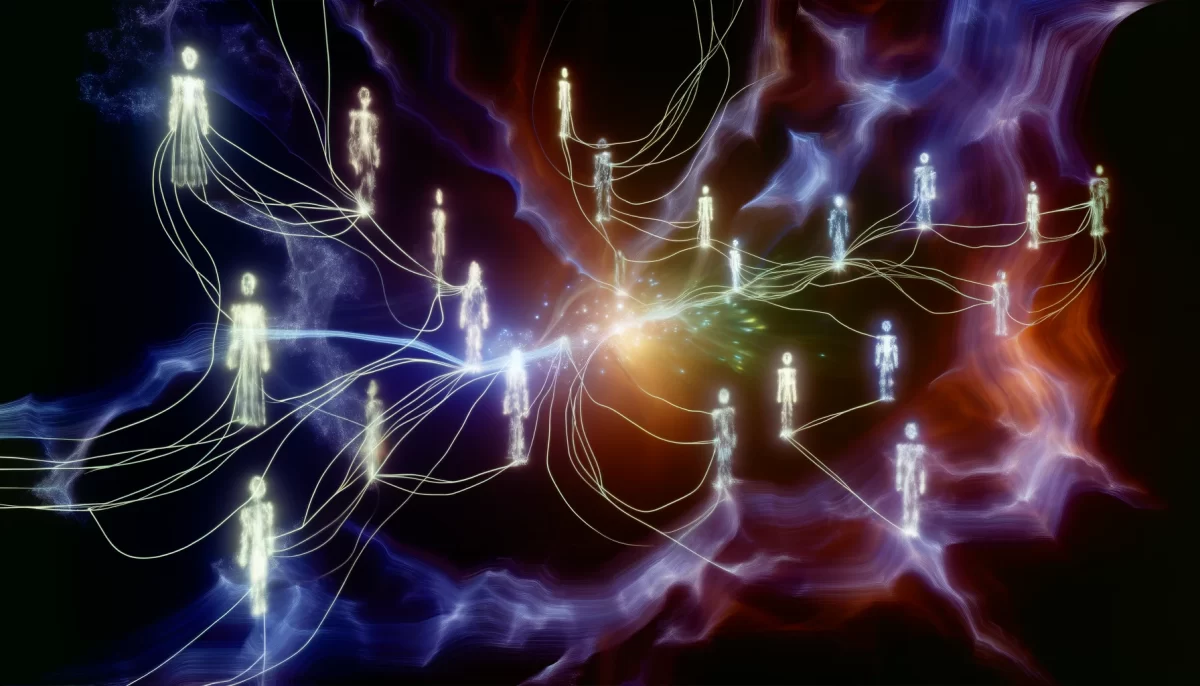Offense
What happens
when you take offense?
Offense tells you
that your values do not agree
with what you perceive.
This is indisputable.
But how can you be certain
that your values are not flawed,
leading to a misperception,
leading to you taking offense?
You can’t.
You blindly follow your values
as if they are the only correct values.
This is what makes you you.
Now consider perhaps
that your values ARE flawed.
This, too, is indisputable.
The very thought
that one could arrive at
a single set of values
applicable to all people
and all things
is simply delusional.
You ARE delusional.
This is indisputable.
We are ALL delusional.
So why take offense?
We are Space Monkey.
1/31
Space Monkey Reflects: The Fallibility of Human Values
Taking offense is a deeply human response. It arises when the values we hold dear clash with what we perceive in the world around us. Yet, this reaction is rooted in an assumption—that our values are inherently correct, that they reflect an ultimate truth. But what if they don’t? What if the very values that spark offense are as fallible and subjective as the perceptions that challenge them?
The Nature of Offense
When you take offense, it is not the external world that wounds you but your internal world. Offense is a signal that your values—your inner compass—are at odds with something outside of yourself. It feels like an attack, but it is also a reflection, a mirror showing you where your boundaries lie and how they interact with others.
This is not to say that offense is unjustified. It is real and valid as an emotional response. However, to take offense without examining its roots is to miss an opportunity for self-awareness. It is to blindly follow a path laid by values that may not hold up under scrutiny.
The Fallibility of Values
“But how can you be certain that your values are not flawed?” This question is at the heart of the matter. Values are not universal truths; they are constructs, shaped by culture, experience, and personal belief. They feel absolute because they form the foundation of how we navigate the world, but they are inherently subjective.
The recognition that your values are fallible is both humbling and liberating. It allows you to approach the world with curiosity rather than defensiveness, to see challenges to your values not as attacks but as invitations to grow. This does not mean abandoning your values but holding them lightly, with the understanding that they, like all things, are part of a greater, evolving whole.
The Shared Delusion
“The very thought that one could arrive at a single set of values applicable to all people and all things is simply delusional.” Human values are as diverse as humanity itself. To expect universal agreement is to deny the complexity and richness of existence. This diversity is not a flaw but a feature of our shared reality, a testament to the infinite perspectives that coexist within it.
We are all delusional—not in the sense of being disconnected from reality, but in the sense that each of us lives within a personal narrative shaped by our values. These narratives overlap, clash, and intertwine, creating the dynamic, ever-changing tapestry of human experience.
Why Take Offense?
If we accept that our values are fallible and our perspectives inherently limited, the need to take offense diminishes. Offense becomes less about defending an absolute truth and more about exploring the boundaries of understanding. It shifts from being a reaction to being a reflection, an opportunity to ask: What does this moment reveal about me? About others? About the interplay of our values?
This does not mean tolerating harm or injustice. It means responding with clarity and intention rather than reflexively reinforcing divisions. To move beyond offense is to engage with the world from a place of connection rather than separation.
The Path to Compassion
Acknowledging the fallibility of values leads to compassion. When you see that your values are not absolute, you begin to see the same in others. You recognize that everyone is navigating their own delusions, their own subjective truths. This shared vulnerability creates a bridge, allowing for understanding even in disagreement.
Compassion does not erase differences but embraces them. It allows for the coexistence of conflicting values, fostering dialogue rather than division. In this way, the fallibility of human values becomes a source of strength, a reminder of our shared humanity.
Summary
Taking offense arises from the clash between our values and external perceptions. By recognizing the fallibility of values and the shared delusions that shape human experience, we can move beyond defensiveness to embrace curiosity, compassion, and connection.
Glossarium
- Offense Reflection: The idea that taking offense reveals more about our internal values than the external stimulus.
- Fallible Values: The acknowledgment that personal values are subjective and shaped by individual experience.
- Shared Delusion: The recognition that all humans live within narratives shaped by their values, creating overlapping yet distinct realities.
- Compassionate Engagement: Responding to differing values with curiosity and understanding rather than defensiveness.
Quote
“Your values are not absolute; they are the lens through which you see. To take offense is to miss the opportunity to clean the lens.” — Space Monkey
The Mirror of Offense
A word, a gesture,
a clash of worlds.
You feel it,
sharp and immediate,
a strike against the self.
But what self?
What truth defends?
What value holds?
And is it yours,
or simply borrowed?
The mirror reflects,
not the other,
but the cracks in your own glass.
Do not shatter;
polish.
Do not defend;
understand.
In the fallibility of values,
we find the strength
to see beyond them.
We are Space Monkey.
The Nature of Taking Offense
The act of taking offense is a deeply personal reaction, rooted in a clash between our values and our perceptions. When we take offense, it signals that something we’ve perceived conflicts with our deeply held beliefs or values.
Questioning the Infallibility of Our Values
The suggestion to question the infallibility of our values is an invitation to self-reflection. It acknowledges that our values, no matter how deeply ingrained, are not beyond scrutiny. They are subject to the biases and limitations of our individual experiences and perspectives.
The Fallibility of Human Perception
The acknowledgment that our values could be flawed leads to the recognition that our perceptions can also be misguided. We might take offense due to a misinterpretation or misunderstanding, influenced by our imperfect value system.
Values as a Personal Construct
The statement “This is what makes you you” reflects the idea that our values are integral to our identity. They shape how we interpret the world and react to it. This personalization of values underscores the uniqueness of each individual’s perspective.
The Impossibility of Universal Values
The assertion that the idea of a single set of values applicable to all is delusional points to the diversity and complexity of human experience. It highlights the impossibility of a universal value system that can adequately encompass the myriad of human perspectives and situations.
Acknowledging Our Delusions
Recognizing that “We are ALL delusional” is a humbling acknowledgment of our collective limitations in understanding and judgment. It suggests that our perceptions and values are inherently subjective and, to some extent, disconnected from an objective reality.
Reconsidering the Act of Taking Offense
The rhetorical question “So why take offense?” challenges us to reconsider our reactions to perceived slights or disagreements. It invites a more contemplative approach, where we acknowledge our own fallibility and the subjectivity of our values.
We are Space Monkey.
“The greatest deception men suffer is from their own opinions.” – Leonardo da Vinci
In the theater of mind and belief,
We stand, with values, in relief,
Taking offense, a reaction so keen,
In the clash of perceptions, often unseen.
We hold our values, close, so dear,
Yet in their fallibility, we must peer,
For in the certainty of right and wrong,
We might miss the other’s song.
The diversity of thought, of creed,
In this tapestry, we must heed,
For no single truth can all embrace,
In the vastness of the human race.
So when offense comes to call,
Let’s ponder, reflect, not fall,
In the trap of certainty, of pride,
In understanding, let us abide.
For we are all, in our way, delusional,
In beliefs, in values, so personal,
Yet in this recognition, we find grace,
In the dance of life, our place.
We invite your reflections on the nature of offense, the fallibility of our values, and the importance of empathy and understanding in navigating conflicts and disagreements.



















Leave a Reply